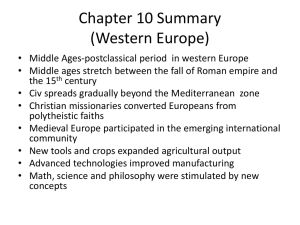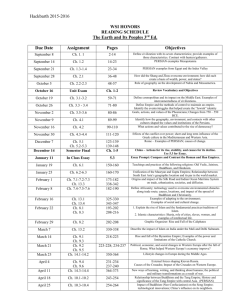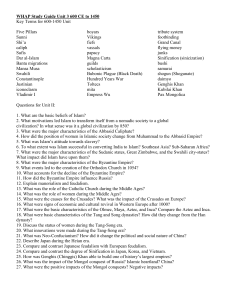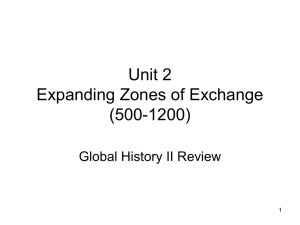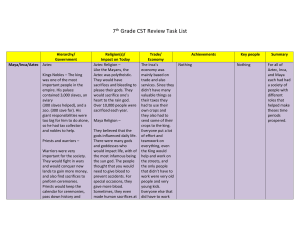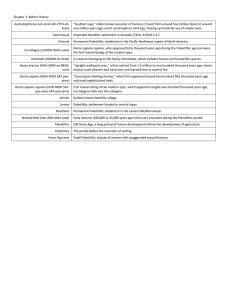Modern World History Unit 1 Vocabulary:
advertisement
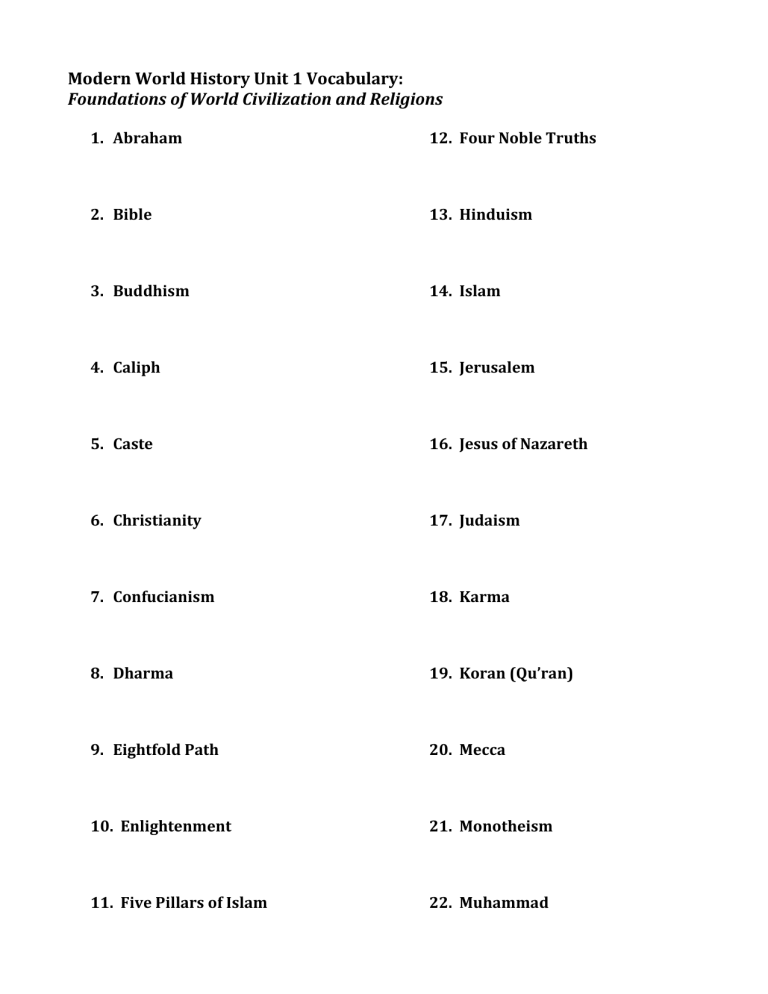
Modern World History Unit 1 Vocabulary: Foundations of World Civilization and Religions 1. Abraham 12. Four Noble Truths 2. Bible 13. Hinduism 3. Buddhism 14. Islam 4. Caliph 15. Jerusalem 5. Caste 16. Jesus of Nazareth 6. Christianity 17. Judaism 7. Confucianism 18. Karma 8. Dharma 19. Koran (Qu’ran) 9. Eightfold Path 20. Mecca 10. Enlightenment 21. Monotheism 11. Five Pillars of Islam 22. Muhammad 23. Nirvana 32. Torah 24. Papacy 33. Aztec empire 25. Polytheism 34. Incan empire 26. Reincarnation 35. Ming dynasty 27. Roman Catholicism 36. Mughal Empire 28. Shi’a 37. Ottoman Empire 29. Siddhartha Gautama 38. Safavid Empire 30. Sunni 39. Songhai Empire 31. Ten Commandments 40. Tokugawa Shogunate Holy text of the Christian religion Islamic ruler Islamic civilization that ruled India from 1526 to 1857 Powerful military leadership that ruled over Japan from the early 1600s to late 1800s Religion with no one sacred leader that originated in India Islam’s holy text Monotheistic religion that originated amongst the Hebrew’s Social classes into which people are born in Vedic and Hindi cultures Sought out by Buddhist; it is the release from the cycle of rebirth Islamic civilization that existed from the mid 1500s to mid 1600s; was located in presentday Iran Scared tenets (key concepts or values) and central doctrine of Buddhism Branch of the Christian religion originating in the former western Roman empire; the pope is the leader Founder of Buddhism Holy city that holds sacred religious sites for Jews, Muslims, and Christians Believed by Christians to be the son of God Larger branch of Islam in which Empire stretching South America’s west coast; known for its impressive networks of roads Religion founded by Jesus of Nazareth and his disciples Religion founded by Muhammad; sacred text is the Qu’ran Belief in one god Sacred tenets (key concepts or values) of Islam One of the oldest religions; founded by Siddhartha Gautama near present-day Nepal “Father” of the (Israelites) Hebrews As described by Buddha: “Right views, right aspirations, right speech, right conduct, right livelihood, right effort, right mindfulness, and right contemplation” Smaller branch of Islam in which members believe that the leader of the religion should be related to Muhammad himself Hindu concept of harmony in the Islamic civilization founded by Turkish nomads; ruled central Asia and parts of Europe and N. Africa from 1453 to 1900s; leader Suleiman ruled during a “golden age” Site of holy pilgrimage for many Muslim people; birthplace of Muhammad Rebirth of the soul into another bodily form; concept central to Hinduism Hebrew’s sacred text Belief in many gods The leadership of the pope Rule of China from the late 1300s to mid 1600s; known for successful exploration and expedition West African civilization that rose to power after the Kingdom of Mali declined Received “revelations” from Allah (God); founder of Islam American empire located in present-day Mexico; known to practice human sacrifice (!) A philosophy practiced in China that emphasized ethics and loyalty Hindu belief that all thought and actions result in future consequences Central moral beliefs/code of members believe that the members of the religion should be chosen from the Muslim community According to Buddhism, if one follows the Eightfold Path, he or she will reach _____________________. universe conduct for the Jewish religion
